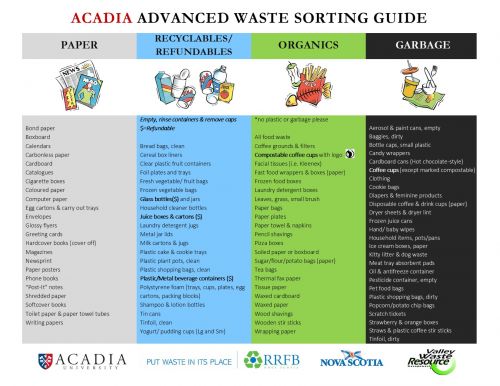Waste Management
Acadia has an advanced waste management system in place to divert a significant amount of waste from landfills in Nova Scotia each year. On average the diversion rate on campus is 70%. The University has been recognized with several waste management awards, including the Institute of the Year Award by RRFB Nova Scotia in 2004.
Physical Plant Services is responsible for managing waste on campus. The Acadia Sustainability Office coordinates campus education and engagement programs and provides assistance to improve institutional performance. All members of the Acadia community have a role to play in managing waste responsibly. Please help us improve our performance by sorting waste correctly and reducing waste generated at Acadia.
Acadia's waste management system is comprised of four primary streams: paper, organics, recyclables/refundables, and garbage. Secondary streams, such as hazardous waste, batteries and e-waste are also collected. For more information refer to the supporting documents and links below.
Plastic Free Campus Program
On March 28th, 2018 Acadia launched a Plastic-Free Campus program to reduce waste on campus and the associated social, financial and environmental impacts from single-use disposable plastics. The program is focused on excessive and unnecessary plastics that are hard to recycle or that often end up in landfills or as litter, polluting the environment and threatening wildlife and human health.
This is a campus wide program with many initiatives developed over the past year. Program highlights include:
- Installation of water fountains with bottle refilling stations in all residences and elsewhere on campus, in partnership with the ASU and campus departments.
- Reduction of straws in ASU restaurant operations.
- Elimination of straws from Chartwells operations.
- Replaced disposable water bottles with reusable bottles in student orientation AXE Packs.
- Reusable rather than plastic bags are provided to all prospective students visiting campus.
- Elimination of plastic bags from the Acadia Bookstore and Athletics Store.
- Elimination of plastic film wrap from print shop operations.
- Chartwells purchased reusable dish covers instead of using plastic wrap for catering.
- Enacted a Single Use Disposable Plastic Bag Policy that restricts distribution of plastic bags at retail locations and as part of regular operations. Read our news release for more details or contact the office.
Zero-Waste Classroom
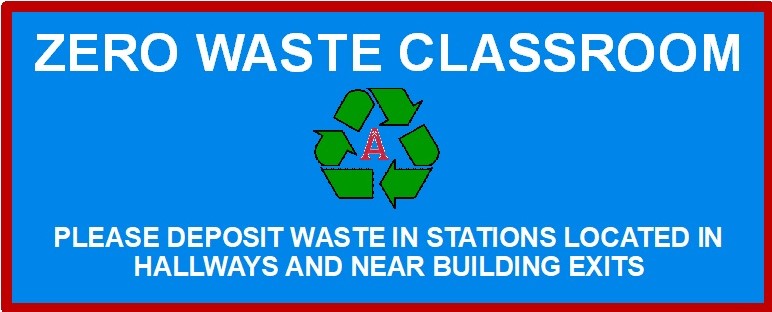
Many departments, including Education and Engineering, have implemented the Zero-Waste Classroom program, which involves encouraging building occupants to sort waste in centrally located waste stations, rather than dispose of waste in single classroom bins. Single garbage bins lead to contamination and reduced recycling and composting rates so they have been removed in these and other locations.
Bottled Water Free Zones
In 2010 a student-led initiative established voluntary Bottled Water Free Zones (BFZ) on campus. The program advocates for access to water as a human right, raises awareness about environmental issues associated with disposable plastic bottles, and argues against the commodification of water in our society. The campus community is encouraged to use reusable water bottles and order water jugs rather than disposable bottles for catered events. As a result of this campaign reusable bottles are now included in welcome packs for new students. Acadia branded water bottles are also for sale at all Acadia retail stores. Bottled Water Free Zones are located on campus in these facilities.
- K.C. Irving Environmental Science Centre
- DeWolfe House (Acadia Sustainability Office & Harriet Irving Botanical Gardens Office)
- Sociology Department
- History Department
- Nutrition Department
- Mathematics & Statistics Department
Physics Department - Earth and Environmental Science Department
- Biology Department
- Acadia Community Farm
Resources
Sorting
Where does it go? Check the Acadia Sorting Guide below or download the PDF Version
Acadia Off-Campus Living Waste Management Guide
For students living off campus we've created a Waste Management Guide (PDF) to help you understand how to manage your waste correctly. It contains information for renters, a sorting guide, tips for moving and more.
Campus Green Event Guide
Planning a catered event on campus? The Green Events Checklist can help you host a greener event at Acadia.
Signage 8.5x11 (PDF & JPG)
| Paper | Recyclables | Refundables | Organics | Garbage |
 |
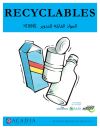 |
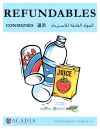 |
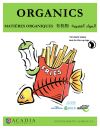 |
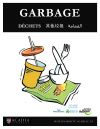 |
FAQs
The Acadia Sustainability Office frequently receives questions about a variety of waste items on campus. Here are answers to some of the most common inquiries:
How do I dispose of single-serve coffee pods?
Single-serve coffee pods are disposed of in garbage, but can be separated into components. Plastic cups go in recycling, covers in garbage and grounds in organics. A better option is to purchase 100% compostable pods such as this option from Jumping Bean, which is also Fair Trade. Note, compostable pods are accepted in organics on campus but not in off campus residential organics collection. Also, they must be certified compostable with the BPI logo as shown below.
Where do I recycle lightbulbs?
CFL bulbs are disposed of in Hazardous Waste due to the small amount of mercury contained in the bulbs. LED and Incandescent bulbs are disposed of in Garbage.
 Are coffee cups recyclable?
Are coffee cups recyclable?
Cups with the Biodegradable Products Institute (BPI) certified compostable logo as shown here can be disposed of in Organics. Cups from the K.C. Irving Centre Cafe and Perkins' are compostable. Some materials in Tim Horton's cups can be recycled, however they must be collected in-store. In all other locations they are disposed of in Garbage. All other cups are disposed of in garbage.
Can I recycle styrofoam?
Meat trays, egg cartons, cups and packing materials can now be included in Recyclables.
Are there environmentally-friendly options for food service disposables?
We encourage everyone to use reusable food service ware as much as possible to reduce waste generated on campus. However, for those rare occasions when you may need disposables there are some options. Royal Chinet plates are certified compostable and are available locally. Bare cups, which are also certified compostable, are now stocked at the Union Market in the Student’s Centre. There are other products on the market, but to be included in the organics stream on campus food service products must be certified by the Biodegradable Products Institute and will have a version of the logo shown above. Please note that although they are accepted on campus they are not necessarily accepted in all organics streams in the province.
Disposal of Surplus Materials and Equipment
Acadia has a policy for Disposal or Purchase of Used Equipment and Materials. We encourage staff and faculty to redistribute or resell surplus equipment or materials in useable condition to reduce waste generated on campus.
Items are listed on the Surplus Items for Sale webpage. Visit Financial Services or for more information.
Electronic Waste (e-waste)

Electronic items contain hazardous materials such as lead, mercury and cadmium and are banned from landfills in Nova Scotia. The Acadia Electronics Waste Program was created in 2009 to divert end of life electronic equipment such as computers, phones and televisions from local landfills. Waste items are diverted to the provincial Electronic Products Recycling Program (EPRA). Any reusable items will be redistributed on campus through the Acadia Surplus Equipment program.
To dispose of Acadia owned electronic waste complete the Acadia e-waste form and your item will be collected by Physical Plant Services. Please clearly indicate "e-waste" on the item(s) or box for pick-up. Alternatively you may return the item(s) directly to Technology Services for processing prior to recycling.
Please note that not all items are recyclable in Nova Scotia at this time. For a complete list visit the EPRA Nova Scotia website. http://recyclemyelectronics.ca/ns/
Most electronics such as computers and computer accessories such as keyboards, scanners and printers as well as phones, fax machines and audio/visual equipment such as TVs are accepted. These items should be returned to Technology Services for processing prior to recycling.
Items such as CDs, DVDs, VHS tapes and some other devices are also not accepted for recycling. These items are disposed of in garbage. Ensure that data is removed from storage devices prior to disposal.
Reusable items can be redistributed through the Acadia Surplus Equipment Program. Contact Physical Plant if you have large items for disposal requiring pick-up.
For more information contact the Sustainability Office or Technology Services.
Personal/Residential Electronic Waste
Personal e-waste is not accepted in the Acadia program. There are four local options for safe disposal of personal/residential e-waste:
- Staples - 9081 Commercial Street, New Minas (Return to Retail)
- New Minas Recycling Inc. - 8751 Commercial Street, New Minas
- Valley Waste Resource Management/Eastern Management centre - 100 Donald E. Hiltz Connector Road, Kentville
- New Boundaries - 79 Centennial Drive, Windsor
For more information about recycling e-waste in Nova Scotia EPRA-Nova Scotia.
Chemical Waste
Safe disposal of any hazardous waste on campus is a priority. Chemicals, such as those used in teaching and research laboratories on campus, are managed in partnership with CleanHarbors Waste Disposal Services. Used chemicals are collected and stored in a secure facility for pick-up and safe disposal by CleanHarbors. Contact the Department of Chemistry for more information about chemical waste on campus.
Battery Recycling
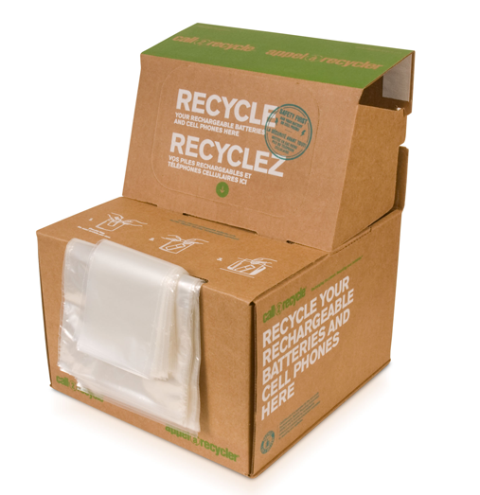
In 2013 Acadia partnered with Call2Recycle to provide battery recycling services at Acadia. Batteries are collected in numerous locations around campus in designated cardboard containers as shown in the picture. Locations include most department offices on campus as well as central stations in Technology Services, Vaughan Memorial Library and Uhall. Numerous types of batteries are collected in the program.
Batteries under 5Kgs accepted include:
- Nickel Cadmium (Ni-Cd )
- Nickel Metal Hydride (Ni-MH)
- Single-use batteries, like alkaline (AA, 9V etc.)
- Nickel Zinc (Ni-Zn)
- Requires bag : Lithium Ion (Li-Ion) and Lithium Primary
- Requires bag: Small Sealed Lead (SSLA/Pb)
- Requires bag: Cell phones (Check with Acadia Telephone Services)
Please Note: Lithium, small sealed lead and cell phone batteries require disposal in bags as per Transport Canada hazardous waste regulations. These are to be sealed in the bags provided or ziplock bags and deposited in the container.
Department Procedure
- Contact Physical Plant Services to request a battery recycling box for your department or residence.
- Designate a staff person, usually an administrative assistant, to serve as a department contact for the program. In residences eco-reps are responsble for managing the program.
- Monitor the box occasionally for contaimination, i.e. batteries not bagged or not items not accepted.
- Once boxes are 3/4 full send a request for pick-up/replacement to physical.plant@acadiau.ca.
- A replacement box should be provided once the filled box is removed. Contact Physical Plant Services if you do not receive a replacement.
Contact jodie.noiles@acadiau.ca for more information on this program or battery recycling in the region.
Toner/Ink Cartridges
Acadia Network Copier/Scanner/Printers and Desktop Printers- Konica Minolta has partnered with Clover Technologies Group, a leading global recycler, to process returned consumables in an environmentally safe and responsible manner. The company provides a free recycling service for toner cartridges and printer cartridges from any manufacturer. Cartridges can be shipped at no charge by any department at Acadia. Visit http://konicaminolta.ca/en/business/clean-planet for details and to print postage paid shipping labels. For more information about this program contact Clover Technologies Group at 1-877-803-6407.
Ink cartridges from desktop printers may also be recycled locally at place of purchase. Staples in New Minas offers a collection in the store.
If you have additional questions please contact the Acadia Sustainability Office.
Books
Books in good condition can be donated or sold to local shops and organizations. For example, the CFUW (Canadian Federation of University Women) holds an annual book sale in March at the Lions’ Hall in Wolfville and they accept books leading up to the event. Contact the CFUW for details https://cfuwwolfville.com/booksale.
Books that are out of date, in poor condition or that cannot be donated or resold can be recycled. Contact Physical Plant services if you have a large volume of books for disposal and they will provide additional bags and bins.
- Hardcover books are accepted in Paper recycling. Departments are responsible for removing the covers. Remove the hard covers first and dispose of it in the Garbage. Place the remainder of the book in Paper recycling. Contact us if you have a large number of books for recycling.
- Softcover books with covers on are accepted in Paper recycling.
- Magazines can be recycled in Paper.
- Dirty, moldy and water damaged books are disposed of in Garbage.
Textbooks for Change

Textbooks that are under 15 years old can be donated to Textbooks for Change. This organization donates textbooks collected from University and College campuses across North America to reduce waste. Every textbook received is reused or recycled, creating amazing environmental impact.

